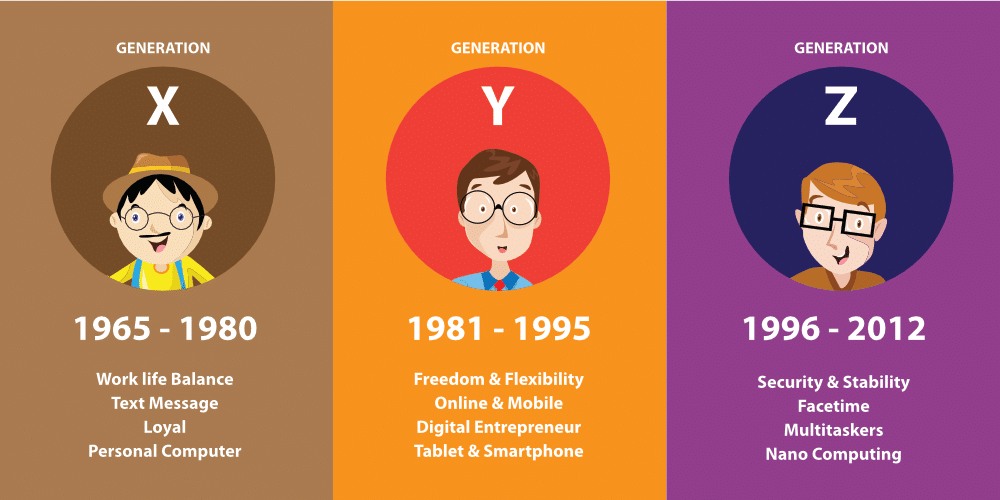The AI-Empathy Paradox: Artificial Intelligence in Student Engagement
Can artificial intelligence in student engagement enhance human connections? See how AI-driven tools help marketers personalize higher ed outreach.
content marketing
Each generational shift sends massive shockwaves through the world of education marketing. Generation Z is already making its mark in education marketing. Is your marketing reaching them effectively?
Here is my take on how education marketers like you can leverage what we know of Generation Z to provide them better quality, more useful information in their educational decision.
While many Millennials remember a time when digital technology was not integral to daily life, no one in Generation Z has any memory of life without a screen.
They’ve grown up with screens in every room of their house. Screens in the family car. Screens in their toy boxes (think: iPad apps for kids). Screens in their classrooms.
The digital world is so embedded in their daily activities, it has become essential to their experience of the world and their expression of themselves.
Being a digital native has produced certain qualities:
The quality of your digital presence and message is crucial to market your school to Generation Z members. Education marketers will need to master the art of digital marketing like never before.
Use rich media like videos, images, and infographics wherever possible. Design every part of your online content for mobile browsing.
But most importantly, treat digital marketing as seriously (or perhaps more so) as you do print marketing.
Although digital marketing may not be as expensive or permanent as printed materials, you should treat it as if it were to meet the high standards of Generation Z.
They are the only generation not to know what the world was like before 9/11. They’ve never known a day without a 24-hour news cycle. They can’t imagine a world without social media. They’re also growing up in homes that were significantly affected by the Great Recession that started in 2008.
Mix terrorism, violence, and economic distress with 24/7 access to an Internet that will show you the gruesome details of it all, and it produces a harshly realistic view of the world. MTV president Sean Atkins told TIME magazine concerning Generation Z:
“They have this self-awareness that systems have been broken. But they can’t be the generation that says we’ll break it even more.”
MTV calls Generation Z “The Founders” because “the name acknowledges that while millennials have disrupted society, it’s this new generation’s job to rebuild it.”

Image by stokk.co via Adobe Stock
Be careful not to paint too cheery of a picture of the world. While marketers should avoid pessimism, be sure to present the problems of the world frankly.
Show young people how your school can prepare them practically to “rebuild” the society that they see as broken.
Many institutions and industries—long since thought to be a permanent fixture of society—have been toppled by globalization and technology. Traditional publishing, television media, energy, news media, marketing, and education have all changed drastically in the last 20 years or so.
As a result, Generation Z members tend to be independent and entrepreneurial.
It seems this new generation is reluctant to trust their careers to corporations, wanting more of a stake in their future than any preceding generation. In fact, up to 72% of high schoolers say they want to start a business someday.
Demonstrate in your marketing content how your institution prepares students to take control of their career, their ministry, or their life.
Generation Z members are self-motivated to seek answers to their questions—and they know how to find those answers. Education marketers need to invest in robust content marketing strategies that will offer the answers young people are looking for.
More than ever, your content must be student-centric, not org-centric. Your messaging should stress how you’re here to empower the student to build their destiny, not preserve your institution.
Feature programs, classes, or degrees that will support Generation Z members in their entrepreneurial quest.
Past generations have been globally aware, but Generation Z is globally minded. Their digitally integrated world isn’t hindered by geographic or political barriers as they converse with friends and followers from around the world on social media.
Location-independent teams are collaborating and doing business from anywhere in the world with a high-speed Internet connection. And we see the offline world following this trend as international travel gets faster, cheaper, and more popular every year.
Even if you’re a rustic campus nestled deep in the woods, you must strive to show prospective students how your school is connected to the world at large. This doesn’t mean you have to be political or into global activism, but prospective students want to see that you’re a part of the events on the world stage.
Feature programs and classes that offer study abroad, work abroad, or missions opportunities. Be creative and forge partnerships with academic organizations in other countries to give your students the global reach they’re looking for.
As part of the rebuilding concept, members of Generation Z feel like they are here to change things. Despite the realism that we talked about earlier, young people today feel hopeful about the future and their role in it.
Another interesting quality of this generation is that although they’re tightly connected to their world, young people desire to be unique, to make a distinct impression. They want to make a change that uniquely reflects their individuality.
Emphasize how your classes, faculty, and programs can foster the prospective student’s creativity and personhood. Feature hero stories of individual students and alumni making a difference.
Do your best to pick out stories to tell of students, alumni, and faculty who are advancing changes in the world in noteworthy or novel ways.
As you review your marketing messaging, you shouldn’t have to rewrite everything. But most education marketers will find themselves having to tweak their content to emphasize certain brand values that resonate deeper with Gen Z youth than other brand values.
We help school brands make their mark on prospective students—and we’d be happy to help you get more out of your marketing as our other clients have achieved. Get ahold of us today!
Then you’ve got to know how to write for the web. That’s why we want to send you our popular ebook: Writing for the Web: 7 Secrets to Content Marketing Success for Education Marketers!

In short, you’ll be able to write the copy that makes your digital marketing strategy work for you.
Featured Image by Michael Flippo via Adobe Stock
Subscribe to The Higher Ed Marketer podcast today!